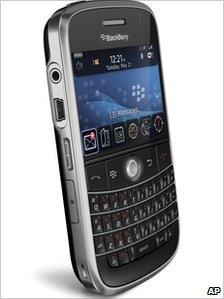Saudi Arabia announces Blackberry messenger deadline
- Published

The Gulf states had previously made warnings about Blackberry functions
Saudi Arabia's telecoms watchdog has called on telecoms firms in the country to block the messenger function on Blackberry handsets from Friday.
The watchdog said the ban would last until the state's three mobile phone operators "fulfil the regulatory requirements it has requested".
But the Communications and Information Technology Commission (CITC) did not reveal what these requirements were.
The United Arab Emirates threatened on Sunday to ban some Blackberry services.
Encrypted data
The two Gulf states have announced the bans on some functions of the Blackberry mobile phone, claiming security concerns.
The United Arab Emirates wants to block sending e-mails, accessing the internet, and delivering instant messages to other Blackberry handsets.
Saudi Arabia had previously announced it was to prevent the use of the Blackberry-to-Blackberry instant messaging service.
Both nations are unhappy that they are unable to monitor such communications via the handsets.
This is because the Blackberry handsets automatically send the encrypted data to computer servers outside the two countries.
'Need for privacy'
Meanwhile Blackberry maker Research in Motion (RIM) has responded to a report in India's Economic Times reported saying the firm will allow Indian security authorities to monitor Blackberry services.
"We won't compromise on the security architecture of our corporate e-mails," said RIM's India spokesman, Satchit Gayakwad.
"We respect the requirements of regulatory bodies in terms of security, but we also look at the customer's need for privacy."
And in a further statement the firm said it co-operated with all governments "with a consistent standard and the same degree of respect".
The firm also denied it had ever provided anything unique to the government of one country that it had not offered to the governments of all countries.
The controversies come as the firm has unveiled a new Blackberry model known as the Torch.
It includes a touchscreen and slideout keyboard, and will go on sale in the US on 12 August for $199.99 with a two-year contract.
- Published26 July 2010